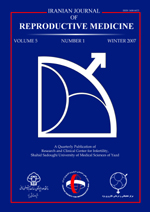
|
International Journal of Reproductive BioMedicine
Research and Clinical Center for Infertility, Shahid Sadoughi University of Medical Sciences of Yazd
ISSN: 1680-6433
EISSN: 1680-6433
Vol. 16, No. 8, 2018, pp. 491-496
|
 Bioline Code: rm18058
Bioline Code: rm18058
Full paper language: English
Document type: Research Article
Document available free of charge
|
|
|
International Journal of Reproductive BioMedicine, Vol. 16, No. 8, 2018, pp. 491-496
| en |
The frequency of TP53 R72P and MDM2 309T>G polymorphisms in Iranian infertile men with spermatogenetic failure: A case-control study
Abadi, Zeinab Ebrahim; Bami, Maryam Khademi; Golzadeh, Maryam; Kalantar, Seyed Mehdi & Sheikhha, Mohammad Hasan
Abstract
Background: Tumor protein p53 (TP53) is a tumor suppressor transcriptional regulator
protein which plays a critical role in the spermatogenesis. One of the most important
regulators of p53 is Murine double minute 2 (MDM2), which acts as a negative regulator of
the p53 pathway. Based on the key role of p53 and MDM2 in germ cell apoptosis,
polymorphisms that cause a change in their function might affect germ cell apoptosis and the
risk of male infertility.
Objective: This study was designed to examine associations of TP53 72 Arg>Pro
(rs1042522), and MDM2 309 T>G (rs937283) polymorphisms with spermatogenetic failure in
Iranian population.
Materials and Methods: A case-control study was conducted with 150 nonobstructive
azoospermia or severe oligozoospermia and 150 fertile controls. The two polymorphisms, 72
Arg>Pro in TP53 and 309 T>G in MDM2, were genotyped using PCR-RFLP and ARMS-PCR
respectively.
Results: Our analyses revealed that the allele and genotype frequencies of the TP53 R72P
polymorphism were not significantly different between the cases and controls (p=0.41, p=0.40
respectively). Also, no significant differences were found in the allelic (p=0.46) and
genotypic (p=0.78) distribution of MDM2 309 T>G polymorphism between patients and
controls.
Conclusion: The results of this study indicate that polymorphisms of TP53 and MDM2 genes
are unlikely to contribute to the pathogenesis of male infertility with spermatogenetic failure.
Keywords
Apoptosis; Male infertility; MDM2; TP53; Polymorphisms.
|
| |
© Copyright 2018 - International Journal of Reproductive BioMedicine
Alternative site location: http://www.ijrm.ir
|
|
